Fleurs du Mal Magazine


Or see the index
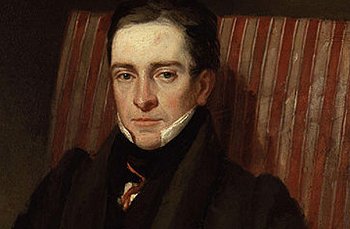
Thomas Hood
(1789-1845)
The Lay of the Laborer
A spade! a rake! a hoe!
A pickaxe, or a bill!
A hook to reap, or a scythe to mow,
A flail, or what ye will—
And here’s a ready hand
To ply the needful tool,
And skill’d enough, by lessons rough,
In Labor’s rugged school.
To hedge, or dig the ditch,
To lop or fell the tree,
To lay the swarth on the sultry field,
Or plough the stubborn lea;
The harvest stack to bind,
The wheaten rick to thatch,
And never fear in my pouch to find
The tinder or the match.
To a flaming barn or farm
My fancies never roam;
The fire I yearn to kindle and burn
Is on the hearth of Home;
Where children huddle and crouch
Through dark long winter days,
Where starving children huddle and crouch,
To see the cheerful rays,
A-glowing on the haggard cheek,
And not in the haggard’s blaze!
To Him who sends a drought
To parch the fields forlorn,
The rain to flood the meadows with mud,
The blight to blast the corn,
To Him I leave to guide
The bolt in its crooked path,
To strike the miser’s rick, and show
The skies blood-red with wrath.
A spade! a rake! a hoe!
A pickaxe, or a bill!
A hook to reap, or a scythe to mow,
A flail, or what ye will—
The corn to thrash, or the hedge to plash,
The market-team to drive,
Or mend the fence by the cover side,
And leave the game alive.
Ay, only give me work,
And then you need not fear
That I shall snare his Worship’s hare,
Or kill his Grace’s deer;
Break into his lordship’s house,
To steal the plate so rich;
Or leave the yeoman that had a purse
To welter in a ditch.
Wherever Nature needs,
Wherever Labor calls,
No job I’ll shirk of the hardest work,
To shun the workhouse walls;
Where savage laws begrudge
The pauper babe its breath,
And doom a wife to a widow’s life,
Before her partner’s death.
My only claim is this,
With labor stiff and stark,
By lawful turn, my living to earn,
Between the light and dark;
My daily bread, and nightly bed,
My bacon, and drop of beer—
But all from the hand that holds the land,
And none from the overseer!
No parish money, or loaf,
No pauper badges for me,
A son of the soil, by right of toil
Entitled to my fee.
No alms I ask, give me my task:
Here are the arm, the leg,
The strength, the sinews of a Man,
To work, and not to beg.
Still one of Adam’s heirs,
Though doom’d by chance of birth
To dress so mean, and to eat the lean
Instead of the fat of the earth;
To make such humble meals
As honest labor can,
A bone and a crust, with a grace to God,
And little thanks to man!
A spade! a rake! a hoe!
A pickaxe, or a bill!
A hook to reap, or a scythe to mow,
A flail, or what ye will—
Whatever the tool to ply,
Here is a willing drudge,
With muscle and limb, and woe to him
Who does their pay begrudge!
Who every weekly score
Docks labor’s little mite,
Bestows on the poor at the temple door,
But robb’d them over night.
The very shilling he hoped to save,
As health and morals fail,
Shall visit me in the new Bastille,
The Spital, or the Gaol!
Thomas Hood poetry
kempis.nl poetry magazine
More in: Archive G-H
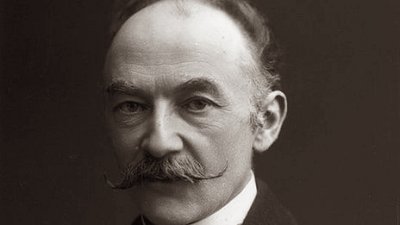
Thomas Hardy
“Ah, Are You Digging on My Grave?”
“Ah, are you digging on my grave
My loved one? — planting rue?”
– “No, yesterday he went to wed
One of the brightest wealth has bred.
‘It cannot hurt her now,’ he said,
‘That I should not be true.’”
“Then who is digging on my grave?
My nearest dearest kin?”
– “Ah, no; they sit and think, ‘What use!
What good will planting flowers produce?
No tendance of her mound can loose
Her spirit from Death’s gin.’ “
“But some one digs upon my grave?
My enemy?—prodding sly?”
– “Nay: when she heard you had passed the Gate
That shuts on all flesh soon or late,
She thought you no more worth her hate,
And cares not where you lie.”
“Then, who is digging on my grave?
Say—since I have not guessed!”
– “O it is I, my mistress dear,
Your little dog, who still lives near,
And much I hope my movements here
Have not disturbed your rest?”
“Ah yes! You dig upon my grave . . .
Why flashed it not on me
That one true heart was left behind!
What feeling do we ever find
To equal among human kind
A dog’s fidelity!”
“Mistress, I dug upon your grave
To bury a bone, in case
I should be hungry near this spot
When passing on my daily trot.
I am sorry, but I quite forgot
It was your resting-place.”
“O joh, graaf jij hier aan mijn graf”
“O joh, graaf jij hier aan mijn graf
Voor tijm-aanplant, mijn schat?”
– “Nee, gisteren is hij gehuwd
Met ‘n ster door weelde opgestuwd.
‘Haar pijn,’ zei hij, ‘is nu geluwd,
Al had ik schuld gehad.’ “
“Maar wie graaft hier dan aan mijn graf?
Mijn liefste broer of zus?”
– “O nee, zij denken maar, ‘Welk nut
Wordt hier uit bloemenkweek geput?
Geen Dood wordt van haar geest geschud
Door terp- of grondwerkklus.’ “
“Maar iemand graaft toch aan mijn graf?
Die feeks?—die roddel jouwt?”
– “Nee: want, nu zij jouw vlees voor goed
De poort door weet, die elk door moet,
Vindt zij dat haat er niet toe doet,
En laat jouw terp haar koud.”
“Maar wie graaft hier dan aan mijn graf?
Vertel—daar ik ‘t niet raad!”
– “O, ik ben het, mijn vrouwtje lief,
Je hond, die menig pootje hief
Hier;—hopelijk doet ongerief
Daaruit jouw rust geen kwaad!”
“O ja! Jij graaft hier aan mijn graf—
Waarom bleek me al niet gauw
Dat één trouw hart hier steeds nog was?
En welk gevoel in ‘t menselijk ras
Houdt ooit ook maar gelijke pas
Met zulke hondentrouw!”
” ‘k Begroef hier, vrouwtje, op je graf
Een kluif, voor op de dag
Dat ik geen voer te vinden weet
Als ik hier in mijn rondje treed.
Spijt heb ik, maar vergat compleet
Dat hier jouw rustplaats lag.”
Thomas Hardy: “Ah, Are You Digging on My Grave?”
in een nieuwe vertaling van: Cornelis W. Schoneveld (jan. 2013)
kempis.nl poetry magazine
More in: Archive G-H, Hardy, Thomas, More translations
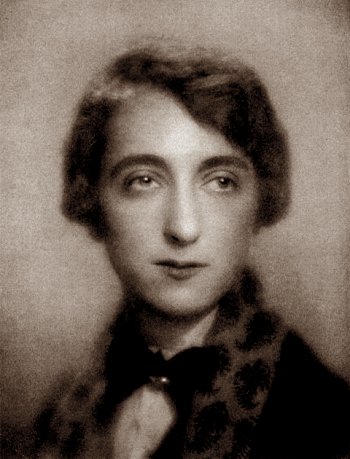
Mireille Havet
(1898-1932)
Le petit cimetière
Derrière le mur du petit cimetière, il y a une chèvre blanche qui mange de l’herbe verte. Derrière le mur du petit cimetière.
Devant le mur du petit cimetière, il y a la place aux pavés inégaux. Devant le mur du petit cimetière. A l’intérieur du petit cimetière, il y a des rangées de tombes et un champ de croix. A l’intérieur du petit cimetière il y a des croix, des croix, des croix !
Beaucoup sont noires, en simple bois ; d’autres en fer aux garnitures touillées, d’autres en pierre, aux fannes ouvragées. Elles sont toutes neuves, ou bien très vieilles, et sur la pierre humide des tombes, ou sur les pierres de granit gris, des fleurs se fanent et l’herbe pousse.
Là sont réunis sous la terre, le tout petit enfant au grand sage, le voleur au prêtre, l’ennemi à l’ennemi et l’ami à l’amie. Là sont réunis sous la terre tous ceux que la vie a séparés. Mais la terre garde bien son secret, elle ne dit pas où sont ses morts et où, nous serons, nous les vivants. Mais la chèvre mange son herbe verte derrière le mur du petit cimetière.
Ah! que de gens, que de gens, que de gens! qu’une chèvre blanche garde en paissant.
Mireille Havet poetry
fleursdumal.nl magazine
More in: Archive G-H, Havet, Mireille, Mireille Havet
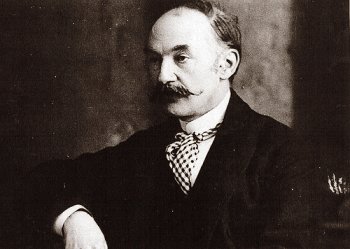
Thomas Hardy
(1840-1928)
Ah, Are You Digging on My Grave?
“Ah, are you digging on my grave
My loved one? — planting rue?”
— “No, yesterday he went to wed
One of the brightest wealth has bred.
‘It cannot hurt her now,’ he said,
‘That I should not be true.'”
“Then who is digging on my grave?
My nearest dearest kin?”
— “Ah, no; they sit and think, ‘What use!
What good will planting flowers produce?
No tendance of her mound can loose
Her spirit from Death’s gin.’ “
“But some one digs upon my grave?
My enemy? — prodding sly?”
— “Nay: when she heard you had passed the Gate
That shuts on all flesh soon or late,
She thought you no more worth her hate,
And cares not where you lie.”
“Then, who is digging on my grave?
Say — since I have not guessed!”
— “O it is I, my mistress dear,
Your little dog, who still lives near,
And much I hope my movements here
Have not disturbed your rest?”
“Ah yes! You dig upon my grave . . .
Why flashed it not on me
That one true heart was left behind!
What feeling do we ever find
To equal among human kind
A dog’s fidelity!”
“Mistress, I dug upon your grave
To bury a bone, in case
I should be hungry near this spot
When passing on my daily trot.
I am sorry, but I quite forgot
It was your resting-place.”
Thomas Hardy poetry
kempis.nl poetry magazine
More in: Archive G-H, Hardy, Thomas
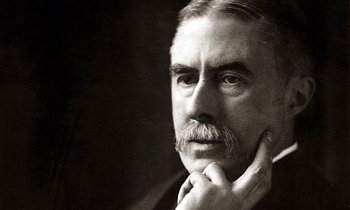
A. E. Housman
(1859-1936)
Eight O’Clock
He stood, and heard the steeple
Sprinkle the quarters on the morning town.
One, two, three, four, to market-place and people
It tossed them down.
Strapped, noosed, nighing his hour,
He stood and counted them and cursed his luck;
And then the clock collected in the tower
Its strength, and struck.
A. E. Housman poetry
kempis.nl poetry magazine
More in: Archive G-H, Housman, A.E.

Laura van der Haar
winnaar NK Poetry Slam 2012
Laura van der Haar uit Amsterdam heeft op 14 december in Utrecht het Nederlands Kampioenschap Poetry Slam 2012 gewonnen. In muziekpaleis Rasa streden acht dichters om de landstitel. Het NK Poetry Slam werd voor de elfde maal gehouden.
In de jury zaten dichter Mustafa Stitou, cabaretière Katinka Polderman en critica Toef Jaeger. In de laatste slamronde werd uitsluitend gestemd door het publiek. In de finale moest Laura van der Haar het opnemen tegen de Vlaming Jee Kast. De finalisten gingen elkaar met woorden te lijf op het podium.
Het publiek stemde met overtuiging voor Laura van der Haar. Ook de jury sprak haar voorkeur uit voor Van der Haar vanwege ‘regels die spankracht hebben’ (Stitou) en de wijze waarop ze haar tegenstander Jee Kast ‘vriendelijk fileerde’ (Jaeger).
Laura van der Haar won de landstitel ‘Slampion 2012’, een geldbedrag van 1000 euro en de wisseltrofee ‘De Gouden Vink’, vernoemd naar dichter en inspirator van vele poetry slammers, Simon Vinkenoog. Van der Haar werkt als archeologe. Naast haar werk volgt ze de Schrijversvakschool en is ze redacteur bij het online literaire tijdschrift ‘Hard//Hoofd’. In mei 2013 zal ze Nederland vertegenwoordigen op het Wereldkampioenschap Poetry Slam in Parijs.
Een Poetry Slam is een wedstrijd voor beginnende dichters waarin zowel de tekst als de voordracht wordt beoordeeld. Tot eerdere winnaars behoren o.a. Erik Jan Harmens, Krijn Peter Hesselink, Ellen Deckwitz en Kira Wuck. Het NK Poetry Slam werd georganiseerd door het Poëziecircus, vanaf 1 januari 2013 het Literatuurhuis.

Alberquerquee baby
met een fletse bek van de kou zink je je huis uit
de stoep veert niet mee en de rest
ook al niet
er is een plek die je kent
waar iemand missen de vale gloed wordt
die soms boven steden hangt
steden, waar ‘s nachts een trein voorbijrijdt
waar gespeeld wordt, muziek
die harkend op een hoop veegt
wat uit jouw hoofd verdween
die hoop wordt een berg om in te schoppen
sneeuw, herfstblaadjes of
de plastic bekers na Koninginnedag, desnoods
je schopt
maar zij verdwijnt niet
jouw Albuquerquee baby
en met boliderode lippen
drukt ze vlinders in je kraag
Laura van der Haar
fleursdumal.nl magazine
More in: Archive G-H, Poetry Slam, THEATRE

Gerard Manley Hopkins
(1844 – 1889)
The Alchemist in the City
My window shews the travelling clouds,
Leaves spent, new seasons, alter’d sky,
The making and the melting crowds:
The whole world passes; I stand by.
They do not waste their meted hours,
But men and masters plan and build:
I see the crowning of their towers,
And happy promises fulfill’d.
And I – perhaps if my intent
Could count on prediluvian age,
The labours I should then have spent
Might so attain their heritage,
But now before the pot can glow
With not to be discover’d gold,
At length the bellows shall not blow,
The furnace shall at last be cold.
Yet it is now too late to heal
The incapable and cumbrous shame
Which makes me when with men I deal
More powerless than the blind or lame.
No, I should love the city less
Even than this my thankless lore;
But I desire the wilderness
Or weeded landslips of the shore.
I walk my breezy belvedere
To watch the low or levant sun,
I see the city pigeons veer,
I mark the tower swallows run
Between the tower-top and the ground
Below me in the bearing air;
Then find in the horizon-round
One spot and hunger to be there.
And then I hate the most that lore
That holds no promise of success;
Then sweetest seems the houseless shore,
Then free and kind the wilderness,
Or ancient mounds that cover bones,
Or rocks where rockdoves do repair
And trees of terebinth and stones
And silence and a gulf of air.
There on a long and squared height
After the sunset I would lie,
And pierce the yellow waxen light
With free long looking, ere I die.
Gerard Manley Hopkins poetry
kempis.nl poetry magazine
More in: Archive G-H, Hopkins, Gerard Manley
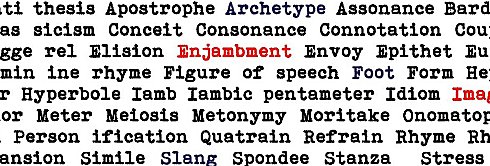
Alfred Edward Housman
(1859 – 1936)
Here Dead We Lie
Here dead we lie
Because we did not choose
To live and shame the land
From which we sprung.
Life, to be sure,
Is nothing much to lose,
But young men think it is,
And we were young.
Alfred Edward Housman poetry
kempis.nl poetry magazine
More in: Archive G-H, Housman, A.E.
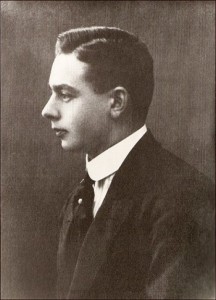
Georg Heym (1887-1912) Von toten Städten . . . Von toten Städten ist das Land bedecket, Wie Kränze hängt der Efeu von den Zinnen. Und manchmal eine Glocke rufet innen. Und trüber Fluß rundum die Mauer lecket. Im halben Licht, das aus den Wolken schweifet, Im Abend gehn die traurigen Geleite Auf Wegen kahl, in schwarzen Flor geschlagen, Die Blumen trocken in den Händen tragen. Sie stehen draußen in verlorner Weite, Ein Haufe schüchtern bei den großen Grüften. Noch einmal weht die Sonne aus den Lüften, Und malt wie Feuer rot die Angesichter. Georg Heym poetry fleursdumal.nl magazine
More in: Archive G-H, Expressionism, Georg Heym, Heym, Georg
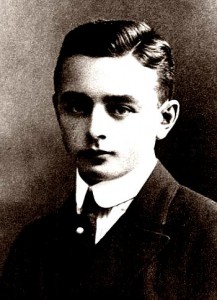
Georg Heym
(1887-1912)
Berlin I
Beteerte Fässer rollten von den Schwellen
Der dunklen Speicher auf die hohen Kähne.
Die Schlepper zogen an. Des Rauches Mähne
Hing rußig nieder auf die öligen Wellen.
Zwei Dampfer kamen mit Musikkapellen.
Den Schornstein kappten sie am Brückenbogen.
Rauch, Ruß, Gestank lag auf den schmutzigen Wogen
Der Gerbereien mit den braunen Fellen.
In allen Brücken, drunter uns die Zille
Hindurchgebracht, ertönten die Signale
Gleichwie in Trommeln wachsend in der Stille.
Wir ließen los und trieben im Kanale
An Gärten langsam hin. In dem Idylle
Sahn wir der Riesenschlote Nachtfanale.
Berlin II
Der hohe Straßenrand, auf dem wir lagen,
War weiß von Staub. Wir sahen in der Enge
Unzählig: Menschenströme und Gedränge,
Und sahn die Weltstadt fern im Abend ragen.
Die vollen Kremser fuhren durch die Menge,
Papierne Fähnchen waren drangeschlagen.
Die Omnibusse, voll Verdeck und Wagen.
Automobile, Rauch und Huppenklänge.
Dem Riesensteinmeer zu. Doch westlich sahn
Wir an der langen Straße Baum an Baum,
Der blätterlosen Kronen Filigran.
Der Sonnenball hing groß am Himmelssaum.
Und rote Strahlen schoß des Abends Bahn.
Auf allen Köpfen lag des Lichtes Traum.
Berlin III
Schornsteine stehn in großem Zwischenraum
Im Wintertag, und tragen seine Last,
Des schwarzen Himmels dunkelnden Palast.
Wie goldne Stufe brennt sein niedrer Saum.
Fern zwischen kahlen Bäumen, manchem Haus,
Zäunen und Schuppen, wo die Weltstadt ebbt,
Und auf vereisten Schienen mühsam schleppt
Ein langer Güterzug sich schwer hinaus.
Ein Armenkirchhof ragt, schwarz, Stein an Stein,
Die Toten schaun den roten Untergang
Aus ihrem Loch. Er schmeckt wie starker Wein.
Sie sitzen strickend an der Wand entlang,
Mützen aus Ruß dem nackten Schläfenbein,
Zur Marseillaise, dem alten Sturmgesang.
Georg Heym poetry
fleursdumal.nl magazine
More in: Archive G-H, Dada, Georg Heym, Heym, Georg
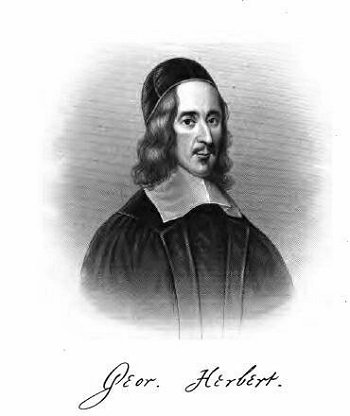
George Herbert
(1593 – 1633)
The Sacrifice
Oh all ye, who pass by, whose eyes and mind
To worldly things are sharp, but to me blind;
To me, who took eyes that I might you find:
Was ever grief like mine?
The Princes of my people make a head
Against their Maker: they do wish me dead,
Who cannot wish, except I give them bread:
Was ever grief like mine?
Without me each one, who doth now me brave,
Had to this day been an Egyptian slave.
They use that power against me, which I gave:
Was ever grief like mine?
Mine own Apostle, who the bag did bear,
Though he had all I had, did not forebear
To sell me also, and to put me there:
Was ever grief like mine?
For thirty pence he did my death devise,
Who at three hundred did the ointment prize,
Not half so sweet as my sweet sacrifice:
Was ever grief like mine?
Therefore my soul melts, and my heart’s dear treasure
Drops blood (the only beads) my words to measure:
O let this cup pass, if it be thy pleasure:
Was ever grief like mine?
These drops being temper’d with a sinner’s tears,
A Balsam are for both the Hemispheres:
Curing all wounds but mine; all, but my fears,
Was ever grief like mine?
Yet my Disciples sleep: I cannot gain
One hour of watching; but their drowsy brain
Comforts not me, and doth my doctrine stain:
Was ever grief like mine?
Arise, arise, they come. Look how they run.
Alas! what haste they make to be undone!
How with their lanterns do they seek the sun!
Was ever grief like mine?
With clubs and staves they seek me, as a thief,
Who am the way of truth, the true relief;
Most true to those, who are my greatest grief:
Was ever grief like mine?
Judas, dost thou betray me with a kiss?
Canst thou find hell about my lips? and miss
Of life, just at the gates of life and bliss?
Was ever grief like mine?
See, they lay hold on me, not with the hands
Of faith, but fury: yet at their commands
I suffer binding, who have loos’d their bands:
Was ever grief like mine?
All my Disciples fly; fear puts a bar
Betwixt my friends and me. They leave the star
That brought the wise men of the East from far.
Was ever grief like mine?
Then from one ruler to another bound
They lead me; urging, that it was not sound
What I taught: Comments would the text confound.
Was ever grief like mine?
The Priest and rulers all false witness seek
‘Gainst him, who seeks not life, but is the meek
And ready Paschal Lamb of this great week:
Was ever grief like mine?
Then they accuse me of great blasphemy,
That I did thrust into the Deity,
Who never thought that any robbery:
Was ever grief like mine?
Some said, that I the Temple to the floor
In three days raz’d, and raised as before.
Why, he that built the world can do much more:
Was ever grief like mine?
Then they condemn me all with that same breath,
Which I do give them daily, unto death.
Thus Adam my first breathing rendereth:
Was ever grief like mine?
They bind, and lead me unto Herod: he
Sends me to Pilate. This makes them agree;
But yet their friendship is my enmity:
Was ever grief like mine?
Herod and all his bands do set me light,
Who teach all hands to war, fingers to fight,
And only am the Lord of hosts and might:
Was ever grief like mine?
Herod in judgement sits while I do stand;
Examines me with a censorious hand:
I him obey, who all things else command:
Was ever grief like mine?
The Jews accuse me with despitefulness;
And vying malice with my gentleness,
Pick quarrels with their only happiness:
Was ever grief like mine?
I answer nothing, but with patience prove
If stony hearts will melt with gentle love.
But who does hawk at eagles with a dove?
Was ever grief like mine?
My silence rather doth augment their cry;
My dove doth back into my bosom fly;
Because the raging waters still are high:
Was ever grief like mine?
Hark how they cry aloud still, ‘Crucify:
It is not fit he live a day, ‘ they cry,
Who cannot live less than eternally:
Was ever grief like mine?
Pilate a stranger holdeth off; but they,
Mine own dear people, cry, ‘Away, away, ‘
With noises confused frighting the day:
Was ever grief like mine?
Yet still they shout, and cry, and stop their ears,
Putting my life among their sins and fears,
And therefore wish my blood on them and theirs:
Was ever grief like mine?
See how spite cankers things. These words aright
Used, and wished, are the whole world’s light:
But honey is their gall, brightness their night:
Was ever grief like mine?
They choose a murderer, and all agree
In him to do themselves a courtesy:
For it was their own cause who killed me:
Was ever grief like mine?
And a seditious murderer he was:
But I the Prince of peace; peace that doth pass
All understanding, more than heav’n doth glass:
Was ever grief like mine?
Why, Caesar is their only King, not I:
He clave the stony rock, when they were dry;
But surely not their hearts, as I well try:
Was ever grief like mine?
Ah! how they scourge me! yet my tenderness
Doubles each lash: and yet their bitterness
Winds up my grief to a mysteriousness.
Was ever grief like mine?
They buffet me, and box me as they list,
Who grasp the earth and heaven with my fist,
And never yet, whom I would punish, miss’d:
Was ever grief like mine?
Behold, they spit on me in scornful wise,
Who by my spittle gave the blind man eyes,
Leaving his blindness to mine enemies:
Was ever grief like mine?
My face they cover, though it be divine.
As Moses’ face was veiled, so is mine,
Lest on their double-dark souls either shine:
Was ever grief like mine?
Servants and abjects flout me; they are witty:
‘Now prophesy who strikes thee, ‘ is their ditty.
So they in me deny themselves all pity:
Was ever grief like mine?
And now I am deliver’d unto death,
Which each one calls for so with utmost breath,
That he before me well nigh suffereth:
Was ever grief like mine?
Weep not, dear friends, since I for both have wept
When all my tears were blood, the while you slept:
Your tears for your own fortunes should be kept:
Was ever grief like mine?
The soldiers lead me to the common hall;
There they deride me, they abuse me all:
Yet for twelve heavn’ly legions I could call:
Was ever grief like mine?
Then with a scarlet robe they me array;
Which shows my blood to be the only way.
And cordial left to repair man’s decay:
Was ever grief like mine?
Then on my head a crown of thorns I wear:
For these are all the grapes SIon doth bear,
Though I my vine planted and watred there:
Was ever grief like mine?
So sits the earth’s great curse in Adam’s fall
Upon my head: so I remove it all
From th’ earth unto my brows, and bear the thrall:
Was ever grief like mine?
Then with the reed they gave to me before,
They strike my head, the rock from whence all store
Of heavn’ly blessings issue evermore:
Was ever grief like mine?
They bow their knees to me, and cry, ‘Hail king’:
What ever scoffs or scornfulness can bring,
I am the floor, the sink, where they it fling:
Was ever grief like mine?
Yet since man’s sceptres are as frail as reeds,
And thorny all their crowns, bloody their weeds;
I, who am Truth, turn into truth their deeds:
Was ever grief like mine?
The soldiers also spit upon that face,
Which Angels did desire to have the grace,
And Prophets once to see, but found no place:
Was ever grief like mine?
Thus trimmed forth they bring me to the rout,
Who ‘Crucify him, ‘ cry with one strong shout.
God holds his peace at man, and man cries out.
Was ever grief like mine?
They lead me in once more, and putting then
Mine own clothes on, they lead me out again.
Whom devils fly, thus is he toss’d of men:
Was ever grief like mine?
And now weary of sport, glad to engross
All spite in one, counting my life their loss,
They carry me to my most bitter cross:
Was ever grief like mine?
My cross I bear my self, until I faint:
Then Simon bears it for me by constraint,
The decreed burden of each mortal Saint:
Was ever grief like mine?
O all ye who pass by, behold and see;
Man stole the fruit, but I must climb the tree;
The tree of life to all, but only me:
Was ever grief like mine?
Lo, here I hang, charg’d with a world of sin,
The greater world o’ th’ two; for that came in
By words, but this by sorrow I must win:
Was ever grief like mine?
Such sorrow, as if sinful man could feel,
Or feel his part, he would not cease to kneel,
Till all were melted, though he were all steel:
Was ever grief like mine?
But, O my God, my God! why leav’st thou me,
The son, in whom thou dost delight to be?
My God, my God –
Never was grief like mine.
Shame tears my soul, my body many a wound;
Sharp nails pierce this, but sharper that confound;
Reproaches, which are free, while I am bound.
Was ever grief like mine?
Now heal thy self, Physician; now come down.
Alas! I did so, when I left my crown
And father’s smile for you, to feel his frown:
Was ever grief like mine?
In healing not my self, there doth consist
All that salvation, which ye now resist;
Your safety in my sickness doth subsist:
Was ever grief like mine?
Betwixt two thieves I spend my utmost breath,
As he that for some robbery suffereth.
Alas! what have I stolen from you? death:
Was ever grief like mine?
A king my title is, prefixt on high;
Yet by my subjects am condemn’d to die
A servile death in servile company;
Was ever grief like mine?
They gave me vinegar mingled with gall,
But more with malice: yet, when they did call,
With Manna, Angels’ food, I fed them all:
Was ever grief like mine?
They part my garments, and by lot dispose
My coat, the type of love, which once cur’d those
Who sought for help, never malicious foes:
Was ever grief like mine?
Nay, after death their spite shall further go;
For they will pierce my side, I full well know;
That as sin came, so Sacraments might flow:
Was ever grief like mine?
But now I die; now all is finished.
My woe, man’s weal: and now I bow my head.
Only let others say, when I am dead,
Never was grief like mine.
George Herbert poetry
kempis.nl poetry magazine
More in: Archive G-H
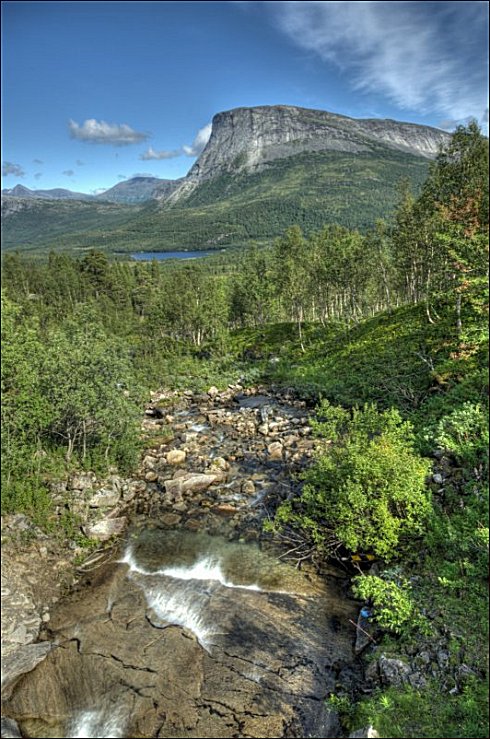
Johann Wolfgang von Goethe
(1749-1832)
Natur und Kunst
Natur und Kunst, sie scheinen sich zu fliehen,
Und haben sich, eh’ man es denkt, gefunden;
Der Widerwille ist auch mir verschwunden,
Und beide scheinen gleich mich anzuziehen.
Es gilt wohl nur ein redliches Bemühen!
Und wenn wir erst in abgemeßnen Stunden;
Mit Geist und Fleiß uns an die Kunst gebunden,
Mag frei Natur im Herzen wieder glühen.
So ist’s mit aller Bildung auch beschaffen:
Vergebens werden ungebundne Geister
Nach der Vollendung reiner Höhe streben.
Wer Großes will, muß sich zusammenraffen:
In der Beschränkung zeigt sich erst der Meister,
Und das Gesetz nur kann uns Freiheit geben.
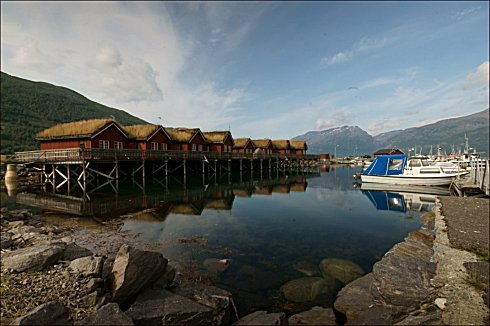
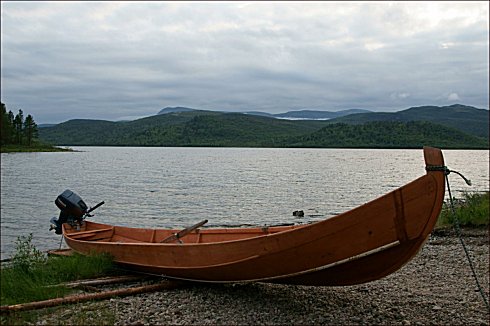
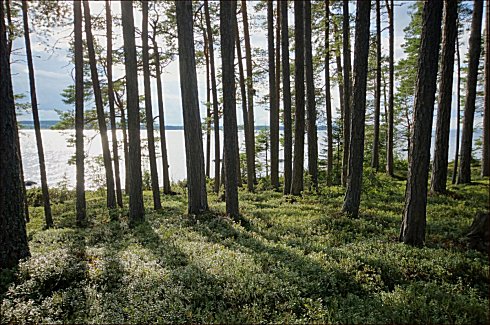
Hans Hermans photos – Natuurdagboek 12-11
Gedicht Johann Wolfgang von Goethe
kempis.nl poetry magazine
More in: Archive G-H, Goethe, Johann Wolfgang von, Hans Hermans Photos
Thank you for reading Fleurs du Mal - magazine for art & literature